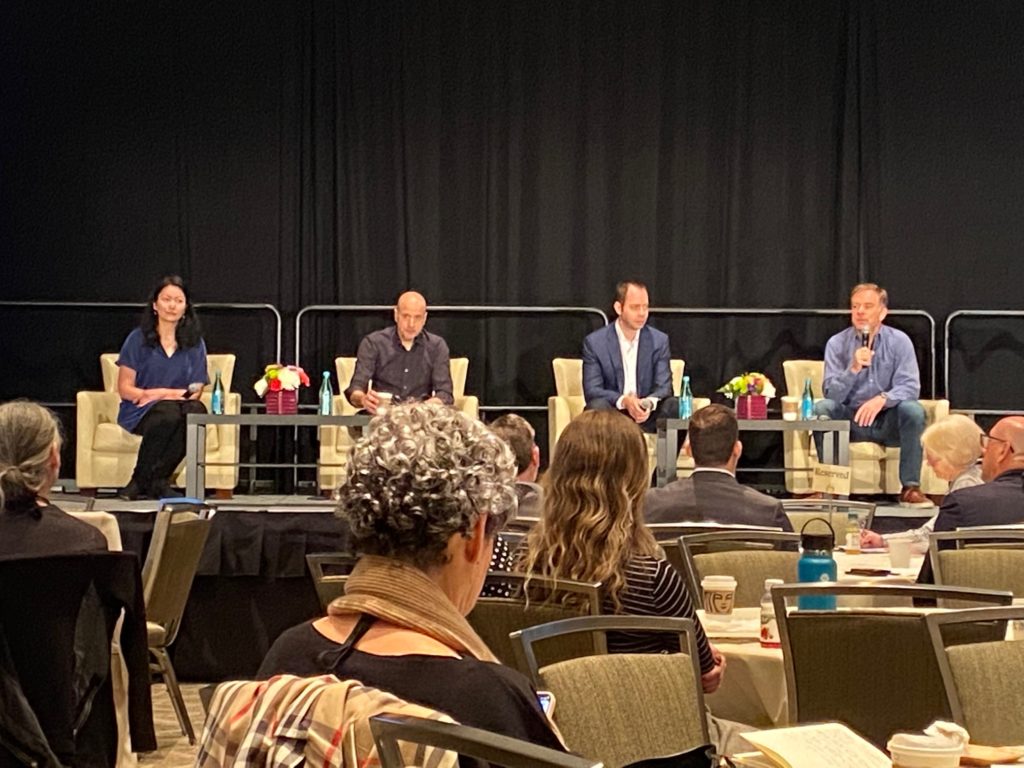Author: Eric Schudiske, CEO and Founder of s2s PR

“THINK”
The famous one-word IBM-born slogan from 1915 granted permission for some of that generation’s most brilliant minds to do exactly what they were intended to do — think. Leadership does that. It unites and focuses teams on clear objectives.
The life sciences, especially in the Pacific Northwest, are a place to study this generation’s leadership principles as CEOs and founders aim to lead tidal shifts in the impact technology landscape.
I recently spent two days embedded amidst the key leaders championing these shifts at Life Science Innovation Northwest 2022 (LSINW22).
It seems the innovation ecosystem here is resetting the pins — that there’s a brief inhale, as startups set the stage for another era of meteoric growth, not just in company finances and valuation, but in impact on peoples’ lives around the world.
It’s just beginning. Life sciences, or more broadly as we see it impact technology startups, in the Pacific Northwest are accelerating in the same way a cast member in The Fast and the Furious series accelerates. Buckle up.
Below is a mashup of 22 guiding leadership principles heard at LSINW underpinning this upcoming next act, primarily an amalgamation of sentiment heard from Steve Harr CEO of Sana, Hans Bishop, former founder of Juno, François Vigneault, CEO of Shape Therapeutics, as well as Clay Siegall, CEO of SeaGen and Heidi Zhang from Tune Therapeutics. (These are paraphrased from comments at LSINW22. Any errors are my own.)
Just remember: think.
Lessons in Startup Savvy:
Why nimble startups outpace current industry titans: Crystalizing impact, the value of being agile, and an experienced C-suite.
1. Your competitive advantage over big pharma and big tech is faster and better decision making.
2. Our superpower is that we have so much skin in the game.
3. The most important thing you’re negotiating for in a partnership isn’t money — it’s control.
4. The hardest questions in biotech: When do you know your hammer is good enough, and then, what nail do you hit?
Recruiting and Retention:
There’s perhaps no bigger barrier in tech and biotech now to scaling and success than attracting and retaining top talent.
5. Focus on hard problems and big ideas. The more important the idea to affect patient outcomes, the more likely you are to attract top talent.
6. Great cultures really allow people to thrive — bad company culture holds people back.
7. Impact attracts alignment. People pay attention to how authentic the leadership is, and the idea is.
8. Talent walks out the day uncertainty walks in.
9. “Are we focused on the right thing?” That’s what we need to be paranoid about every day.
Life Sciences and Tech Turbulence:
Life sciences startups are now recruiting from traditional tech more so than at any other time. But the lab-and-whitecoat and laptop-and-headphones cultures often struggle to find compatibility. It’s a growing struggle for this industry.
10. Tech and biology is like running a 3 legged race — you run a little slow but if you run alone you’ll fall down.
11. Convergence of different career experiences in tech and life sciences is not straightforward.
12. Data science is being completely transformed in medicine.
13. Make sure you don’t fall in love with your own data.
14. Challenge the data. Clinical data doesn’t become commercial data.
15. Being great at one technology is really hard. Being great at two technologies and putting two together is really, really hard.
Live Life Sciences Out Loud:
Messaging matters to your investors, team, and your wider community. Can you explain the why and how of your technology?
16. You have to know your why before you know your how.
17. How can you tell your story to make it compelling? How is it different and why should I care?
18. Start with the idea and why it’s important.
Living Impact Tech Ethos:
I remember a friend, in the early days of Google and Facebook remarking that the greatest minds of this generation were monetizing clicks. Impact technology, from cleantech, through education in VR, and of course, the life sciences is the antidote to that sentiment, where great minds are galvanized by a greater calling.
19. Work for stakeholders — not just shareholders, but also employees and partners.
20. This industry is complex and hard, and none of us have the answers individually — we must approach challenges as a team.
21. We are in this to develop medicines and affect human health.
22. When facing a difficult decision, ask, “What would a patient ask us to do?” — and keep that as our moral compass.
We end on that quote, from Steve Harr, about a moral compass for a reason. If there’s a difference between impact technology startups, particularly life sciences startups, it’s that a moral compass helps point the direction for decision making. It’s also the industry’s advantage that those from coders to clinicians and lab techs to technology luminaries are securing their own legacies to improve the human condition, not just monetize clicks. Think about that.